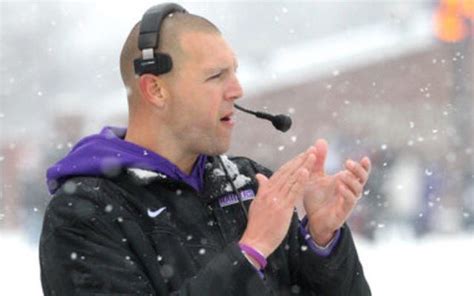A Quote by Jeanie Buss
I think it's impossible to tell your coach and tell your players, 'Try not to win.' That goes against everything an organization is about.
Quote Topics
Related Quotes
Most of the time you are growing up, people tell you what's wrong with you. Your coach tells you, your parents tell you, the teachers tell you when they grade you. I think that's very good in the early stages, because it helps you then develop skills. But at some point in your career, generally I think when you are in your teens, you look in a mirror and you have to say, despite all the bumps and warts, "I like that person I'm looking at, and let's just do our best."
There are only three measurements that tell you nearly everything you need to know about your organization's overall performance: employee engagement, customer satisfaction, and cash flow...It goes without saying that no company, small or large, can win over the long run without energized employees who believe in the mission and understand how to achieve it.
Do not allow your thoughts to become greater than you. No matter what your thoughts tell you, don't listen. Remember your thoughts are not your friend. Your thoughts try to confound you, confuse you. And they will tell you all kinds of things. Do not listen to your thoughts, even your good thoughts. Transcend everything, go beyond your thoughts to your bliss, to your joy and to your happiness.
Sometimes it's not catastrophic. Sometimes you only come to the bottom of your coffee cup. Sometimes you have a good day. No one wants to know. No one wants to tell you about theirs either. You might somehow take it. Turn it against them. See the flaw. You always tell them the whole thing sucks. It keeps you alive. They figure if you're out there having a rotten time, everything's fine and you're doing your part. No one will ever try to take your bad times away from you but they'll come swarming for your happiness.
Find your own picture, your own self in anything that goes bad. It's awfully easy to mouth off at your staff or chew out players, but if it's bad, and your the head coach, you're responsible. If we have an intercepted pass, I threw it. I'm the head coach. If we get a punt blocked, I caused it. A bad practice, a bad game, it's up to the head coach to assume his responsibility.
I think you reveal yourself by what you choose to photograph, but I prefer photographs that tell more about the subject. There's nothing much interesting to tell about me; what's interesting is the person I'm photographing, and that's what I try to show. [...] I think each photographer has a point of view and a way of looking at the world... that has to do with your subject matter and how you choose to present it. What's interesting is letting people tell you about themselves in the picture.


































